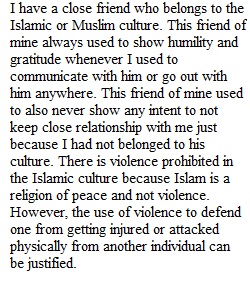


Q Purpose: The purpose of this assignment is for you to critically think about different terms and concepts from each week and to engage in discussion with your peers on an online platform. Knowledge: This assignment is designed to provide for you a better "real world" understanding of the terms, concepts, and theories you will learn about each week. The discussion boards give you space to connect specific terms, concepts, and theories to your experience of the world and engage with others on an online platform. Task: To successfully complete this assignment, you will: 1. Follow the prompt that will be given by Monday of each new week. 2. Respond to the prompt using specific examples from the text, lecture, films, etc. Your responses need to be thought-out and detailed. An ideal response will be 10-15 sentences long. 3. RESPOND to another classmate's post for that week. Your response should also be well thought-out and detailed, a minimum of four sentences long. Replying with comments like "I agree with u," or "thanks for sharing" will not be accepted. 4. Complete both your original post and reply to student by Thursday at Midnight. Criteria for Success: You will be graded using the following criteria: 1. Posts are on time. 2. Your original post is detailed and is using specific examples from the course content, and is a minimum of 10 sentences in length. 3. You provide a detailed reply to another classmate's post. A quality comment that engages the other person and furthers the discussion is required. Prompt For this week’s discussion board, I would like for you to reflect upon your own intercultural relationships. In particular, think about your closest relationship with someone who is from a culture different from your own. This could be someone who is ethnically or religiously different from you. In addition, they can be a best friend, a partner or spouse, or a family member. As you reflect on this relationship, I want you to write about something you learned about their culture that you did not know before you met them, and one misunderstanding you had with this person because of a difference in cultural backgrounds. This misunderstanding can be because of issues of differences in perception, high context/low context, individualism/collectivism, language, nonverbals, etc. This is a good time to reflect on the different terms and concepts we have learned to this point. For example, my grandmother-in-law is a full blooded member of the Cherokee tribe in Oklahoma. When my wife and I went on our year long road trip, we spend six weeks with her in Muskogee, OK where I was exposed to and learned not only about her Cherokee heritage, but also the cultural history of the Sac and Fox nation, which was the ethnicity of my wife’s grandfather. One of the things I learned from Grandma Green was that her family could trace its lineage through the Trail of Tears back to the land in what is now North Carolina. We spent many nights up talking to her about her memories of growing up and the forced assimilation into White American culture, including her parents being forced into White Christian boarding schools, and being stripped of their native names. One of the things she told us that stuck with me was that when Native Americans were rounded up in Oklahoma, they were divided into groups and given the same last name, which was usually just a color. Indeed, my grandmother-in-law’s last name is Green, and her younger daughter (my aunt) married a man with the last name Brown. Tracing their heritage back just a few generations, we can see where their names went from Fishinghawk to Green. One of the biggest misunderstandings I had with Grandma Green was by not fully grasping the intersectionality of her cultural identities, for while she is Native American, she is also a devout Baptist. So much of the oppression her ancestors faced was predicated on the conversion to Christianity. It was a wonderful experience, however, to have Grandma Green explain the nuances between her ethnic heritage and her religious identity. It was a great example of how the intersections of our identities create completely unique experiences of the world. Grandma Green is 90 years old now. She was one of the youngest of 12 and she is the only one left. I know that when she passes, a large amount of knowledge about Cherokee culture is going to be lost with her. For the discussion post, please post the following: 1. Talk about one relationship you have with someone who is of a different cultural background. 2. Write about one thing you learned about their culture that you did not know until you met them. 3. Write about a miscommunication you had with this person that can be attributed to your different cultural backgrounds. 4. Both your initial post and your reply are due Thursday by midnight.
View Related Questions